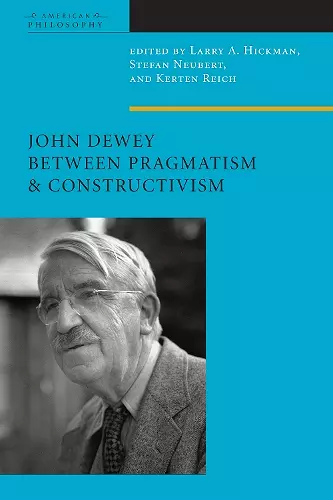John Dewey Between Pragmatism and Constructivism
Larry A Hickman editor Stefan Neubert editor Kersten Reich editor
Format:Hardback
Publisher:Fordham University Press
Published:16th Mar '09
Currently unavailable, and unfortunately no date known when it will be back
This hardback is available in another edition too:
- Paperback£22.99(9780823251827)

Readers with a focused interest in American Philosophy, Pragmatism, Naturalism, and John Dewey.
Deals with theories of interaction and transaction, communication and culture, learning and education, community and democracy, theory and practice, and inquiry and methods
Many contemporary constructivists are particularly attuned to Dewey's penetrating criticism of traditional epistemology, which offers rich alternatives for understanding processes of learning and education, knowledge and truth, and experience and culture.
This book, the result of cooperation between the Center for Dewey Studies at Southern Illinois University Carbondale, and the Dewey Center at the University of Cologne, provides an excellent example of the international character of pragmatist studies against the backdrop of constructivist concerns. As a part of their exploration of the many points of contact between classical pragmatism and contemporary constructivism, its contributors turn their attention to theories of interaction and transaction, communication and culture, learning and education, community and democracy, theory and practice, and inquiry and methods.
Part One is a basic survey of Dewey's pragmatism and its implications for contemporary constructivism. Part Two examines the implications of the connections between Deweyan pragmatism and contemporary constructivism. Part Three presents a lively exchange among the contributors, as they challenge one another and defend their positions and perspectives. As they seek common ground, they articulate concepts such as power, truth, relativism, inquiry, and democracy from pragmatist and interactive constructivist vantage points in ways that are designed to render the preceding essays even more accessible. This concluding discussion demonstrates both the enduring relevance of classical pragmatism and the challenge of its reconstruction from the perspective of the Cologne program of interactive constructivism.
"Writings by American and German scholars of the American philosopher." -The Chronicle of Higher Education "This book is a unique collaboration by leading scholars of Dewey on both sides of the Atlantic. The contributors illuminate theoretical resonance, and dissonance, between classical pragmatism and contemporary constructivism." -- -David T. Hansen Teachers College, Columbia University "A substantial contribution to the theoretical literature on constructivism and Dewey's pragmatism-highly readable and lively debate that should provoke stimulating discussion among philosophers." -- -Nel Noddings Stanford University "An ambitious, innovative work that seeks to bring together popular culture studies with political philosophy." -- -William Gavin University of Southern Maine "The planetary reach of John Dewey's thought comes alive in this trenchant discussion of his epistemology and philosophy of education. It is salutary, indeed, that the American and German Center for Dewey Studies provide us with this refreshingly cross-cultural inquiry." -- -John J. McDermott Texas A&M University "A novel and significant collaboration by American pragmatists and German constructivists, this volume identifies, clarifies and critically develops the pragmatic-constructivist approach." -- -Michael Eldridge University of North Carolina, Charlotte "This volume grew out of the remarkably successful collaboration of American and German scholars. The contributors demonstrate the international scope and intense contemporary relevance of Dewey's thought. They achieve impressive clarity in their account of the relations of pragmatism to constructivism as it developed in the Twentieth Century." -- -John Lachs Vanderbilt University This book originated in a conference at the University of Cologne in 2001. It consists of a series of essays discussing the relationship between John Dewey's pragmatism and German constructivism. The latter bears many similarities to certain strains of 20th-century French thought--that of Michel Foucault in particular. Like French poststructuralism, constructivism has roots in German phenomenology, but it derives from other traditions as well. The contributions by Reich (U. Cologne) and Kenneth W. Stikkers (Southern Illinois U.--Carbondale) detail various aspects of this history, while the contributions of Hickman (SIU--Carbondale), Jim Garrison (Virginia Tech), and Neubert (U. Cologne) focus on Dewey's work. Part 2 discusses the legacy of Dewey for both constructivism and pragmatism. Hickman's second contribution raises some doubts about the constructivist project, claiming that it has become another variety of cognitive relativism, similar to French postmodernism or American neopragmatist thought. The collection concludes with an edited e-mail discussion among the contributors. This book will be useful for scholars researching the contemporary relevance of Dewey's thought and pragmatism more generally, both in the US and in Europe. Summing Up: Recommended. Upper-level undergraduates through faculty/researchers. -Choice "This tidy volume marks a milestone in the ongoing efforts of Larry Hickman to advocate for Deweyan pragmatism as a world philosophy. Like John Dewey himself-a social and political reformer on the international stage-Dewey's version of pragmatism is transactional, pluralistic, and resolutely cosmopolitan. In this tightly integrated collection of essays, a team of American and German educators place pragmatism and the Cologne-style interactive constructivism in dialog, and serving as an object lesson in itself for both approaches, provide a compelling argument for the international relevance of an always contemporary pragmatism. " -- -Roger T. Ames University of Hawai'i
ISBN: 9780823230181
Dimensions: unknown
Weight: unknown
296 pages